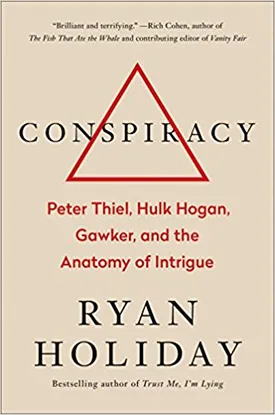Conspiracy: Peter Thiel, Hulk Hogan, Gawker, and the Anatomy of Intrigue by Ryan Holiday
The Conspiracy by Ryan Holiday delves into the story of Peter Thiel’s orchestrated campaign to take down Gawker Media and the role played by Hulk Hogan in the entire affair. It consists of interviews that Holiday had with several key players as well as archival evidence to trace the intricate web of events to reveal the anatomy of intrigue.
The whole saga began when Gawker published a sex tape featuring Terry "Hulk Hogan" Bollea which had been recorded without his permission. Peter Thiel, the co-founder of Paypal, had been cruelly targeted by Gawker over the years, and this was his chance to take revenge. In 2016, he unveiled his secret collaboration with Hogan and his army of top lawyers to quietly file a lawsuit against Gawker.
Holiday dives into the strategy that Thiel and his team devised, how they operated in the shadows, and how they duped Gawker into providing legal and financial support that they never expected. It traces the complex network of lawyers, financial advisors, publicists and investigators that formed the puzzle of deceit.
Further, The Conspiracy details the full scope of the case, which included evidence that Thiel had funneled millions of dollars to Hogan in secret payments and promises of more, and details the significant media coverage and public relations war that led to Gawker ultimately being forced into bankruptcy and selling its assets.
Thiel’s ultimate goal in assembling this secret team was to prove that Gawker was a “company of bullies who have gone unchecked for far too long” - exposing them to the world and ultimately destroying them. His goal of publicly shaming Gawker, Holiday illustrates, was rapidly achieved.
Holiday goes on to explore the wider implications of Thiel’s actions, including key questions of billionaire power, privacy, and media censorship. He provides a thought-provoking analysis of what happened and of the implications of wealthy individuals using their power and wealth to attempt to quash criticism of their actions. Additionally, he explores the role of the internet, social media, and online news outlets in transforming a story that involves privacy and financial misconduct as well as legal maneuvering, into “one of the most dramatic stories in corporate and media history.”
Simply put, The Conspiracy paints an incisive portrait of one of the most remarkable stories of our time and its key players. It is an eye-opening account of the lengths to which power and money can be used to silence those who have antagonized us. It also serves as a warning to those in positions of power and influence, cautioning them against the disastrous consequences of retaliatory legal action that is aimed more at silencing criticism than actually expressing justice. Ultimately, The Conspiracy is a must-read for anyone interested in modern business, media, and culture.

